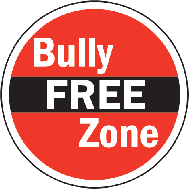Anti Bullying At Caslon
To access this school’s Anti-
To access this school’s Behaviour Policy please click HERE.
 Caslon pupils can report a bulling issue in a number of ways.
Caslon pupils can report a bulling issue in a number of ways.
- Each class has a worry box on the wall outside the classroom. Pupils can post a concern or a worry about bullying in here.
- Pupils can email antibullying@caslon.dudley.sch.uk to report a bullying problem
- Pupils can talk to their parent/teacher/support staff
At Caslon Primary Community School a Rights Respecting Ethos is embedded throughout our school. The children are taught about the values, attitudes and skills which foster mutual respect and caring towards others, creating an effective and caring school. The UNCRC is at the heart of Caslon Primary Community School and is the basis for all of our policies. Bullying of any kind is unacceptable at our school.
Definition of Bullying
When someone repeatedly and deliberately says or does mean or hurtful things to another person.
There are three components of bullying:
- Repeated
- Intentional
- Power Imbalance
Traditional bullying can be ….
- Physical –
hitting, kicking, shoving, prodding, gesturing, taking another’s property - Emotional –
intimidation, social exclusion, degrading, demeaning, controlling or humiliating - Verbal –
teasing, name calling, insulting, threatening or taunting - Social –
using friendships as a way to hurt someone else, gossiping, spreading rumours, leaving others out, refusing to speak to a friend, cyber bullying - Cyber bullying is similar to traditional bullying in that it is repeated, intentional and based on a power imbalance
Warning Signs, the following are indications that a child may be being bullied:
- Avoiding or fear of going to school
- Sudden poor academic progress
- Frequent health complaints –
headaches, stomach aches etc - Withdrawing or losing interest in activities with friends
- Feeling sad, moody, anxious, depressed, withdrawn, helpless
- Unexplained or implausible injuries
- Damaged or missing clothing or personal belongings
- Trouble sleeping –
or frequent nightmares 
- Changes in eating patterns
- Avoiding or spending excessive time on the computer
- Significant mood changes after using the computer
What can parents do?
Parents can play a central role to preventing bullying and stopping it when it happens. Here are a few things you can do.
- Teach kids to solve problems without using violence and praise them when they do.
- Give children positive feedback when they behave well to help their build self-
esteem. Help give them the self- confidence to stand up for what they believe in. - Ask your children about their day and listen to them talk about school, social events, their classmates, and any problems they have.
- Take bullying seriously. Many kids are embarrassed to say they have been bullied. You may only have one chance to step in and help.
- Support bully prevention programs in your child’s school. If your school doesn’t have one, consider starting one with other parents, teachers, and concerned adults.
What we do at Caslon
At Caslon we do not tolerate bullying of any kind. If we discover that an act of bullying or intimidation has taken place, we act immediately to stop any further occurrences of such behaviour. While it is very difficult to eradicate bullying, we do everything in our power to ensure that all children attend school free from fear.
We are proud to provide high quality nurture and pastoral care for the pupils of our school. As a Rights Respecting School, we do not tolerate bullying. In order to support children who feel they are being bullied we have appointed five Anti-
These are post boxes outside each classroom where children can post a note if they are worried about something at school. This could be a bullying issue, something about school work or any other worry. The team meet with Mr Hill to look at the notes and then decide how best to support the child.
Our school behaviour policy is therefore designed to support the way in which all members of the school can live and work together in a supportive way. It aims to promote an environment where everyone feels happy, safe and secure.
If bullying occurs:
- A secure environment is provided in which incidents can be reported confidently. –
- A log is kept of bullying incidents (including the date of the incident/s).
- A Bullying Box is available for witnesses or victims to share incidents of bullying which will be responded to immediately.
- The pupil who has been bullied should be made to feel safe and treated in a respectful manner.
- All pupils should be aware/shown that bullying is taken seriously.
- Consistency is of the utmost importance in the recording of incidents and the response to bullying.
- The school should protect and support all parties involved.
- The person who has bullied should be encouraged to behave in an acceptable way (refer to charters/UNCRC etc.).
- Interventions should be closely monitored and followed up appropriately.
Procedures:
- Bullying and cyberbullying incidents are logged and reported.
- Incidents will be reported to Special Educational Needs Co-
coordinator (SEND) and Senior Management Team (SMT). - In serious cases of bullying, parents of all children involved should be informed and will be asked to come and have a meeting to discuss the incident. This may involve, Teachers, Teaching assistants, Learning Mentors, Senior Management Team (SMT) or Head teacher. The bullying behaviour is investigated and the bullying will be dealt with.
- The bully/bullies will receive support to change their behaviour (e.g. Learning Mentor interventions as appropriate) –
The victim will receive support from learning mentors as deemed appropriate. - All incidents will be followed up and monitored.

